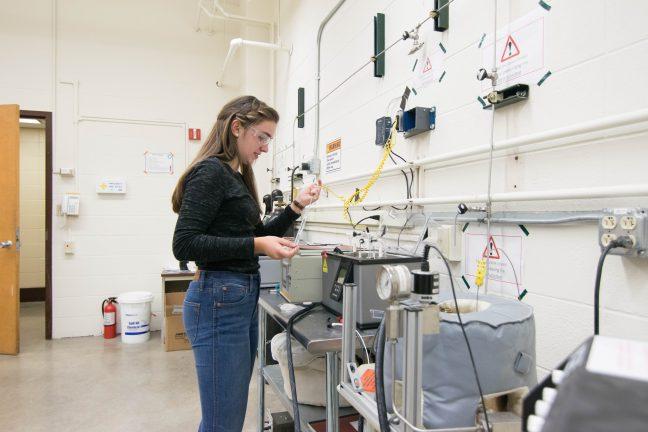A paper from Nature Partner Journals titled “Not yet defect-free: The current landscape for women in computational materials research” was published in June. The paper highlights the various barriers women computational sciences researchers face and suggests strategies to combat gender inequality in the field.
Science, technology, engineering and math fields have received backlash for decades because of the need for diversity in their respective subjects, according to the paper.
In fact, for the past 150 years, the under-attribution of women’s accomplishments in science has been a topic of discussion but was never addressed in research according to co-author and assistant professor at Wellesley College Erin Teich.
This paper — a literature review — was written as a means of addressing the current climate of computational sciences and contributing to the conversation in a formal manner, Teich said.
Associate professor of computational chemistry at the University of Warwick Livia Bartok-Partay discussed this topic with her colleagues long before authoring the article. After taking up a leadership role in the equality, diversity and inclusion team in the chemistry department, she held regular discussions about creating an inclusive environment in the computational chemistry department. Bartok-Partay said her discussions often referenced the gender imbalance in the discipline.
“This is something that I think most female scientists are going to be able to relate to,” Bartok-Partay said. “Last year, there were a couple of specific occasions where I personally felt the unfairness of the environment. I just really got angry that this is still going on, and in 2020 to 2023, we still have to fight these instances.”
The authors found the study’s statistics tell a story of how gender biases have led to real disadvantages for women in their fields and suggest how much or how little progression has been made for gender equity in STEM, Bartok-Partay said.
For example, there is a leaky pipeline trend in the fields of materials science and engineering, chemical engineering, physics and chemistry, where the proportion of women decreases at every progressive step in the career ladder, according to the paper.
Feminist Biology Initiative introduces gender-fair research to biology
Computer science and mathematics have also seen the percentage of female graduates decline in the past decades, according to the article.
Women are statistically given fewer opportunities to interpersonally share their opinions compared to men. They are more likely to be interrupted and have their ideas dismissed by the group — sometimes their ideas are even restated by men who receive positive responses, according to the article.
These gender disadvantages may have arisen from different social conditions, Tiech said. For example, disciplines in STEM have been widely portrayed as “boys’ subjects.” According to the article, decades of social conditions create expectations for acceptable behavior for women, contributing to differential expectations between women and men in the computational research environment.
Women are more attuned to the existence of these biases because they directly experience them in their fields, Teich said.
Women are also less likely to be perceived and accepted as leaders, which directly affects a researcher’s success — students are more likely to favor male supervisors because they are perceived as more prestigious, according to the article.
These biases take root at an early age, and there are many different bias phenomena existing at different levels within the academic ladder. The messaging our society has grown up with is often more unwelcoming to women interested in scientific fields than it is for men, Teich said.
Published research and representative statistics have become very helpful for calling out undesirable behaviors, as well as breaking down these barriers for women, Bartok-Partay said. Drawing attention to these inequitable situations reveals gender-based microaggressions are not an isolated event — these things happen systematically.
This information can empower women because it shows they are not alone in their adverse experiences and encourages them to call out those conditions, Bartok-Partay said.
“Since we wrote this article, I feel like I’m also more empowered to say to colleagues that, for example, ‘Look, we just went through these statistics, and I cannot see a female name in the invited speakers, I cannot see a female name among the supervisors. This cannot be right. Are you sure that we’ve considered everyone that should have been considered for this position or for this invitation or for these roles?’” Bartok-Partay said.
Experts consider future of Wisconsin at annual Climate Change Symposium
According to the article, it is important to acknowledge the existence of bias, educate the public, raise awareness, participate in training and remember to challenge others’ and one’s own biases. There is also a need for female models to build visibility for women.
This is a complex topic that will require a long process over a lifetime to improve, Bartok-Partay said.
It is important girls in primary school are encouraged to ask questions about the world around them, challenge boundaries and acquire the value of learning, hard work and an inquiring mind, according to Bartok-Partay.
“It’s going to take some time, and not just the academics need to change, but the whole society has to shift where we do not associate girls being kind and nice and the boys being adventurous and clever,” Bartok-Partay said.


















